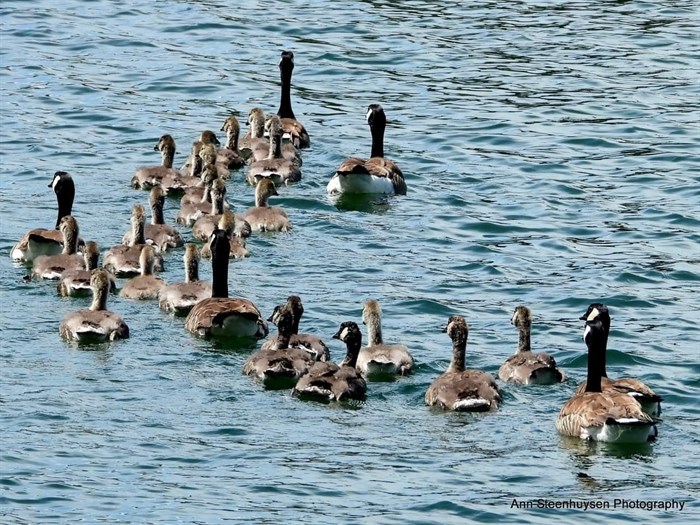
Canada goose families swim on Shuswap Lake in spring, 2024.
Image Credit: SUBMITTED/ Ann Steenhuysen
January 04, 2025 - 7:00 AM
Avian influenza was detected in waterfowl at Shuswap Lake and Mara Lake recently, in large part thanks to a dog.
Sicamous resident Sherrey Hykaway was walking her dog on a stretch of beach on the Eagle River at the end of October when she was alerted to the problem.
“I’ve walked my dog down this beach every day for six years and I’ve never seen dead geese before,” she said. “My dog was finding them in the water and bringing them to shore, and was trying to eat them.”
A few days later, Hykaway observed a goose on the shoreline in front of her condo enter the Eagle River and start spinning around in circles. That’s when she called the conservation officer service.
“I knew something was wrong, it looked like a severe neurological problem,” she said.
She said a conservation officer came out to investigate and collected a dead bird from the beach.
“Someone else had called about dead birds on Mara Lake, two dead loons and bunch of dead geese,” she said.
The birds were sent to a facility in Nanaimo for testing, and roughly ten days ago, Hykaway received an email confirming the birds were infected with avian influenza.
Avian influenza is caused by the type A influenza virus and can affect several species of food producing birds, pets and wild birds and in very rare cases humans, according to the Canadian Food Inspection Agency.
Most avian influenza viruses are low pathogenic and don’t cause serious harm, while the highly pathogenic types H5 and H7 can cause severe illness and death in birds.
There has been a global spread of avian viruses since 2022 resulting in the culling of more than 6.5 million birds in B.C., and since the beginning of October the virus has been detected on at least 22 poultry farms in BC and in numerous wild birds and small animals.
READ MORE: Overwhelmed West Kootenay breeder surrenders 11 puppies to SPCA
The District of Sicamous issued a public notice about the issue on Dec. 20.
“In early November, testing was initiated following reports of deceased Canada and Cackling geese near the mouth of the Eagle River and at Mara Lake,” the said in a media release. “Test results confirmed the presence of (avian influenza) in the geese.”
Humans can contract avian flu by touching an infected animal and then touching their eyes, nose, mouth or face, although the risk of transmission is low. Symptoms of infection in humans is similar to the regular human flu.
The district advises residents not to touch sick or dead animals or their droppings or bring sick wild animals home. Pets should be kept away from infected animals.
“We are hopeful that this is a localized outbreak that has now subsided,” the district said.
READ MORE: South Okanagan renovator discovers historical community treasure
Hykaway said she hasn’t seen anymore dead birds on her long beach walks since the incident.
“I was concerned for my dog, but thankfully he’s OK,” she said. “It’s a concern for dog owners, I’m hoping to bring awareness to others. I wouldn’t have noticed if it wasn’t for my dog.”
Residents can report sightings of dead waterfowl that appear unusual to the BC Bird Mortality Line at 1-866-431-2473.
To contact a reporter for this story, email Shannon Ainslie or call 250-819-6089 or email the editor. You can also submit photos, videos or news tips to the newsroom and be entered to win a monthly prize draw.
We welcome your comments and opinions on our stories but play nice. We won't censor or delete comments unless they contain off-topic statements or links, unnecessary vulgarity, false facts, spam or obviously fake profiles. If you have any concerns about what you see in comments, email the editor in the link above. SUBSCRIBE to our awesome newsletter here.
News from © iNFOnews, 2025